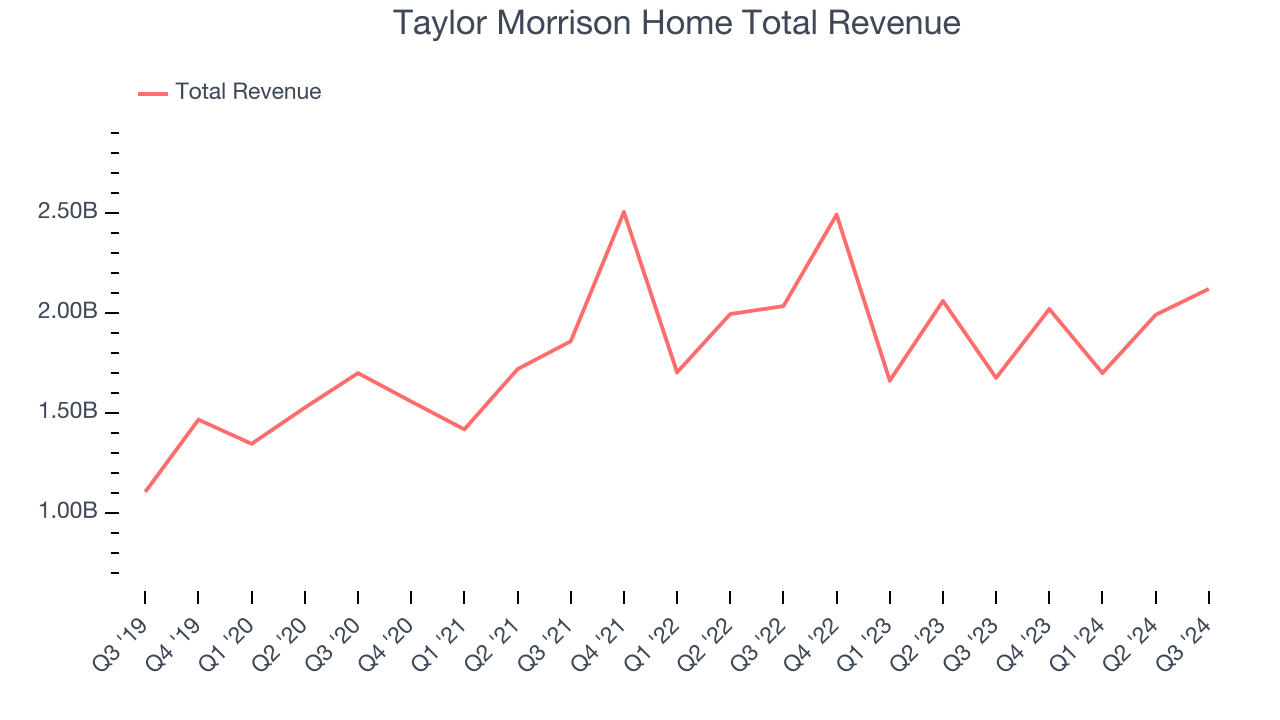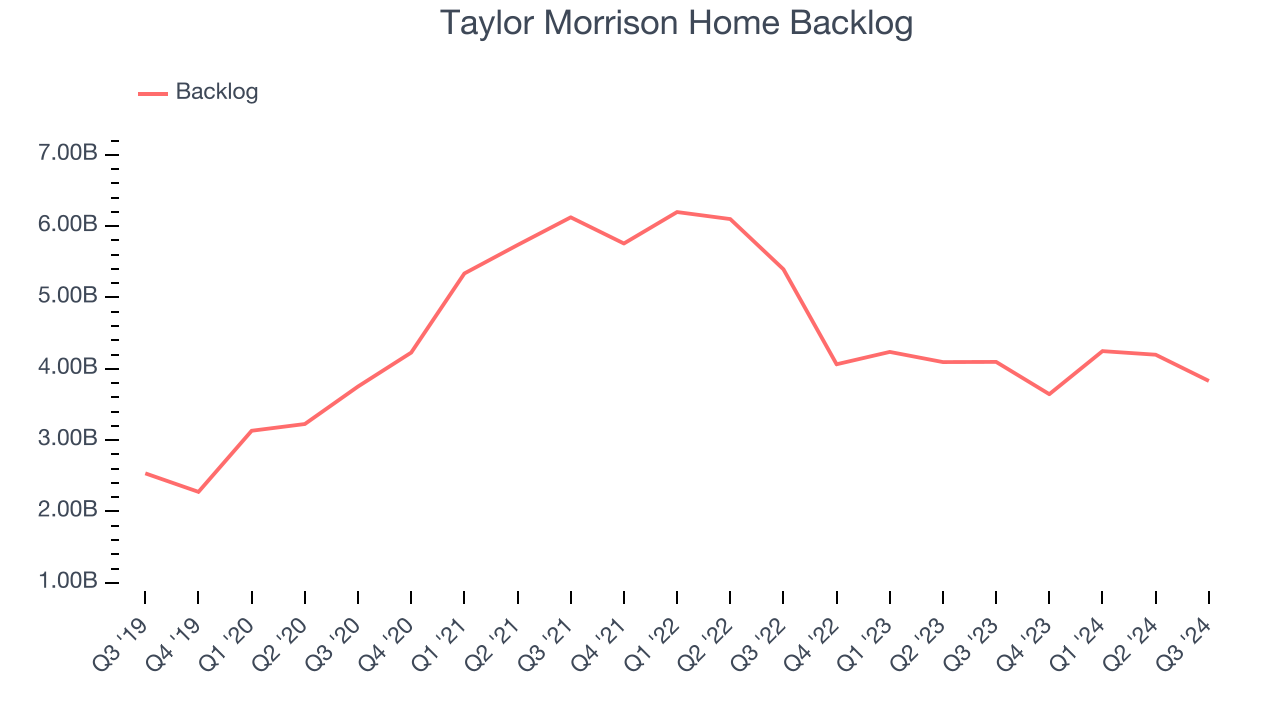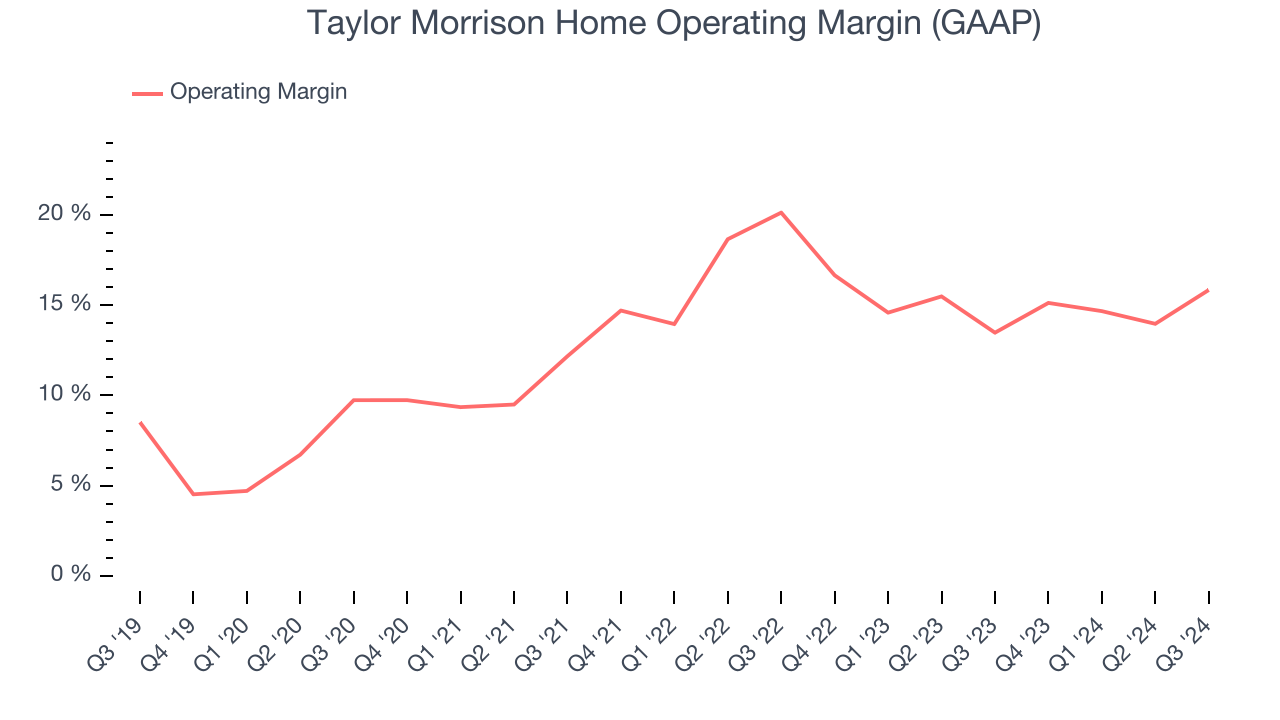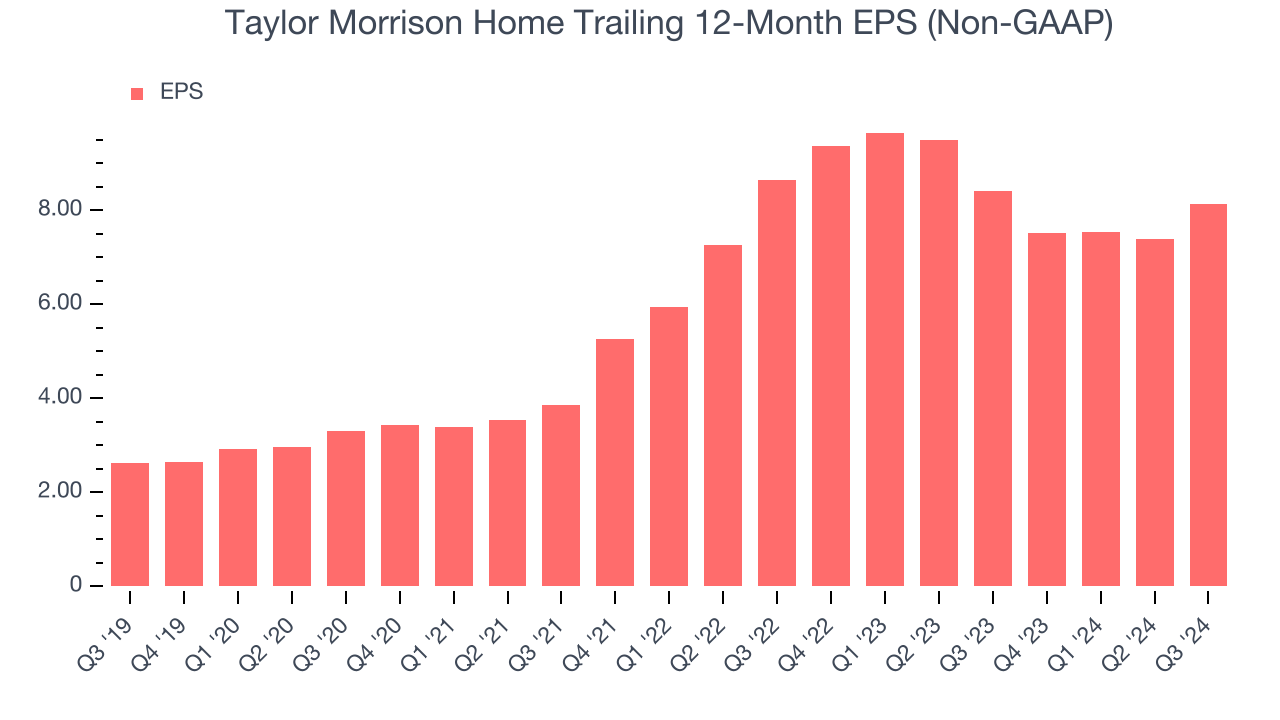Homebuilder Taylor Morrison Home (NYSE:TMHC) reported Q3 CY2024 results exceeding the market’s revenue expectations, with sales up 26.6% year on year to $2.12 billion. Its non-GAAP profit of $2.37 per share was also 15.9% above analysts’ consensus estimates.
Is now the time to buy Taylor Morrison Home? Find out by accessing our full research report, it’s free.
Taylor Morrison Home (TMHC) Q3 CY2024 Highlights:
- Revenue: $2.12 billion vs analyst estimates of $1.97 billion (7.8% beat)
- Adjusted EPS: $2.37 vs analyst estimates of $2.04 (15.9% beat)
- EBITDA: $374.3 million vs analyst estimates of $318.1 million (17.6% beat)
- Gross Margin (GAAP): 25%, up from 23.5% in the same quarter last year
- EBITDA Margin: 17.6%, up from 14% in the same quarter last year
- Backlog: $3.83 billion at quarter end, down 6.5% year on year
- Market Capitalization: $6.76 billion
"In the third quarter, our team delivered better-than-expected results, which clearly demonstrated the benefits of our diversified consumer and geographic strategy, as well as our team's impressive execution in the face of continued interest rate volatility, economic uncertainty and hurricane-related disruptions," said Sheryl Palmer, Taylor Morrison CEO and Chairman.
Company Overview
Named “America’s Most Trusted Home Builder” in 2019, Taylor Morrison Home (NYSE:TMHC) builds single family homes and communities across the United States.
Home Builders
Traditionally, homebuilders have built competitive advantages with economies of scale that lead to advantaged purchasing and brand recognition among consumers. Aesthetic trends have always been important in the space, but more recently, energy efficiency and conservation are driving innovation. However, these companies are still at the whim of the macro, specifically interest rates that heavily impact new and existing home sales. In fact, homebuilders are one of the most cyclical subsectors within industrials.
Sales Growth
Examining a company’s long-term performance can provide clues about its business quality. Any business can put up a good quarter or two, but the best consistently grow over the long haul. Thankfully, Taylor Morrison Home’s 10.5% annualized revenue growth over the last five years was impressive. This shows it expanded quickly, a useful starting point for our analysis.

We at StockStory place the most emphasis on long-term growth, but within industrials, a half-decade historical view may miss cycles, industry trends, or a company capitalizing on catalysts such as a new contract win or a successful product line. Taylor Morrison Home’s recent history marks a sharp pivot from its five-year trend as its revenue has shown annualized declines of 2.5% over the last two years.
We can dig further into the company’s revenue dynamics by analyzing its backlog, or the value of its outstanding orders that have not yet been executed or delivered. Taylor Morrison Home’s backlog reached $3.83 billion in the latest quarter and averaged 16.5% year-on-year declines over the last two years. Because this number is lower than its revenue growth, we can see the company hasn’t secured enough new orders to maintain its growth rate in the future. 
This quarter, Taylor Morrison Home reported robust year-on-year revenue growth of 26.6%, and its $2.12 billion of revenue topped Wall Street estimates by 7.8%.
Looking ahead, sell-side analysts expect revenue to grow 5.7% over the next 12 months, an acceleration versus the last two years. Although this projection shows the market thinks its newer products and services will fuel better performance, it is still below average for the sector.
Unless you’ve been living under a rock, it should be obvious by now that generative AI is going to have a huge impact on how large corporations do business. While Nvidia and AMD are trading close to all-time highs, we prefer a lesser-known (but still profitable) semiconductor stock benefitting from the rise of AI. Click here to access our free report on our favorite semiconductor growth story.
Operating Margin
Analyzing the trend in its profitability, Taylor Morrison Home’s annual operating margin rose by 8.3 percentage points over the last five years, as its sales growth gave it operating leverage.

This quarter, Taylor Morrison Home generated an operating profit margin of 15.8%, up 2.4 percentage points year on year. The increase was encouraging, and since its operating margin rose more than its gross margin, we can infer it was recently more efficient with expenses such as marketing, R&D, and administrative overhead.
Earnings Per Share
Analyzing long-term revenue trends tells us about a company’s historical growth, but the long-term change in its earnings per share (EPS) points to the profitability of that growth – for example, a company could inflate its sales through excessive spending on advertising and promotions.
Taylor Morrison Home’s EPS grew at an astounding 25.3% compounded annual growth rate over the last five years, higher than its 10.5% annualized revenue growth. This tells us the company became more profitable as it expanded.

We can take a deeper look into Taylor Morrison Home’s earnings quality to better understand the drivers of its performance. As we mentioned earlier, Taylor Morrison Home’s operating margin expanded by 8.3 percentage points over the last five years. This was the most relevant factor (aside from the revenue impact) behind its higher earnings; taxes and interest expenses can also affect EPS but don’t tell us as much about a company’s fundamentals.
Like with revenue, we analyze EPS over a more recent period because it can give insight into an emerging theme or development for the business. For Taylor Morrison Home, its two-year annual EPS declines of 3% mark a reversal from its (seemingly) healthy five-year trend. We hope Taylor Morrison Home can return to earnings growth in the future.
In Q3, Taylor Morrison Home reported EPS at $2.37, up from $1.62 in the same quarter last year. This print easily cleared analysts’ estimates, and shareholders should be content with the results. Over the next 12 months, Wall Street expects Taylor Morrison Home’s full-year EPS of $8.14 to grow by 4.6%.
Key Takeaways from Taylor Morrison Home’s Q3 Results
We liked how Taylor Morrison Home beat analysts’ EBITDA expectations this quarter. We were also excited its revenue outperformed Wall Street’s estimates. On the other hand, its backlog missed. Since backlog is a leading indicator of future revenue, it often dictates the share performance following earnings. Shares traded down 2.9% to $63.01 immediately after reporting.
Is Taylor Morrison Home an attractive investment opportunity at the current price?When making that decision, it’s important to consider its valuation, business qualities, as well as what has happened in the latest quarter. We cover that in our actionable full research report which you can read here, it’s free.
